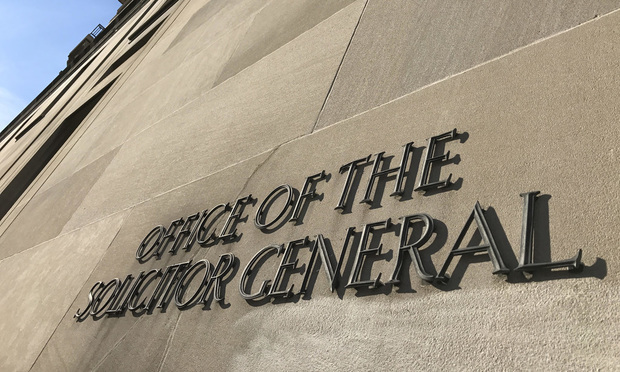 The U.S. Solicitor General’s Office at the U.S. Justice Department in Washington. Credit: Mike Scarcella/ National Law Journal
The U.S. Solicitor General’s Office at the U.S. Justice Department in Washington. Credit: Mike Scarcella/ National Law Journal
One item on an otherwise routine U.S. Supreme Court orders list on Monday caught the eye of high court devotees and triggered questions across the Twitter-verse: “The motion of the solicitor general to argue pro hac vice is granted.”
A pro hac vice request from the Office of Solicitor General? How could it be that a member of the government’s top appellate team was not a member of the Supreme Court bar?
The government’s request in the case, Digital Realty Trust v. Somers, was unusual but not unprecedented. U.S. Solicitor General Noel Francisco filed it on behalf of Christopher Michel, an assistant to the solicitor general who “because of his knowledge of the case and his legal ability would be especially qualified to present oral argument for the government.” Michel, a former Kirkland & Ellis associate, joined the Solicitor General’s Office in September.
Supreme Court Rule 5 states that to qualify for admission to the bar of the court, “an applicant must have been admitted to practice in the highest court of a state, commonwealth, territory or possession, or the District of Columbia for a period of at least three years immediately before the date of application; must not have been the subject of any adverse disciplinary action pronounced or in effect during that three-year period; and must appear to the court to be of good moral and professional character.”
The justices will hear arguments in Digital Realty on Nov. 28—before Michel will be eligible for admission to the Supreme Court bar, according to Francisco’s motion. Michel is just shy of the Rule 5 requirement: He was admitted to the bar of the Virginia Supreme Court in December 2015.
The United States has filed an amicus brief supporting Paul Somers in the Digital Realty case. The justices will decide whether employees are protected under Dodd-Frank’s whistleblower provisions for either reporting alleged misconduct internally to management or through the U.S. Securities and Exchange Commission. The Justice Department believes the law protects employees “regardless of whether those whistleblowers report to the commission.”
Because of the high court’s filing deadlines, Francisco was forced to file the pro hac vice motion and a motion for divided argument on or before Oct. 10 and before the government had filed its own amicus brief. The justices on Monday granted both motions.
Michel graduated from Yale Law School in 2013 and then served one-year clerkships first for Judge Brett Kavanaugh of the U.S. Court of Appeals for the D.C. Circuit and then for Chief Justice John Roberts Jr. After his clerkships, he was an associate at Kirkland & Ellis and taught as an adjunct professor at Georgetown University Law Center.
The law, however, was not his first profession. Michel served more than five years as a speechwriter and White House director of speechwriting for President George W. Bush. He then assisted Bush with his presidential memoir, “Decision Points.”
As the solicitor general’s motion noted in a footnote, the high court has authorized pro hac vice arguments by the Solicitor General’s Office “on a number of previous occasions.” One of those arguments was in the 2009 case, United States ex rel. Eisenstein v. City of New York. And who was the pro hac vice lawyer? Jeffrey Wall, then an assistant to the solicitor general. Wall is now the principal deputy solicitor general, serving under Francisco.
The U.S. Justice Department’s amicus brief in Digital Realty is posted below.


